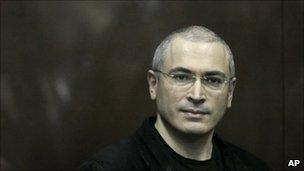Russia ex-tycoon Khodorkovsky appeals against jail term
- Published

Khodorkovsky has been serving time at a remote prison in Siberia
A lawyer for Mikhail Khodorkovsky has lodged an appeal against the new jail term handed down to the former Russian oil tycoon.
The lawyer, Karina Moskalenko, said there had been procedural violations at the trial.
She is also defending Khodorkovsky's business partner Platon Lebedev. On Thursday they were both told that they would have to stay in jail until 2017.
The former Yukos oil bosses were jailed for embezzlement and money-laundering.
The two men had been nearing the end of a separate eight-year sentence for tax evasion.
Western criticism
The US and European countries have criticised the court's verdict, voicing suspicions about politicisation of the judiciary.
The sentence means Khodorkovsky, once Russia's richest man, will not return to society until well after the next Russian presidential election.
He was once seen as a threat to former President Vladimir Putin. As the current prime minister, Mr Putin could become the Kremlin-backed candidate again in 2012.
Khodorkovsky and Lebedev were found guilty of stealing billions of dollars from their own oil firm, Yukos, and laundering the proceeds.
They were first arrested in 2003 and sentenced in 2005 for fraud and tax evasion.
The US said the new sentence seemed to be an abuse of Russia's legal system.
Russian Foreign Minister Sergei Lavrov hit back on Friday, describing the judiciary as "independent of both the Russian and the foreign authorities".
Earlier, German Chancellor Angela Merkel said she was "disappointed" by the sentence. "The impression remains that political motives played a role in the trial," she said.
And UK Foreign Secretary William Hague said he was deeply concerned and urged Russia "to respect the principles of justice and apply the rule of law in a non-discriminatory and proportional way".
"In the absence of this the UK and much of the international community will regard such a trial as a retrograde step," Mr Hague added.
- Published30 December 2010
- Published22 December 2013
- Published27 December 2010
- Published27 December 2010